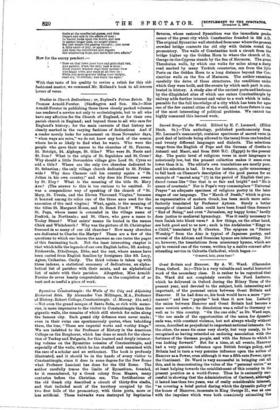Sacred Songs of the World. Edited by H. C'. Leonard.
(Elliot Stock. 6s.)—This anthology, published posthumously from Mr. Leonard's manuscript, contains specimens of sacred verse (a good deal of latitude being allowed to the term) from one hundred and twenty different languages and dialects. The selections range from the English of Pope and the German of Goethe to Ashanti and Maori, and from 2000 B.C. (Egypt) to the present day. The poetic level of religious verse in most Languages is notoriously low, but the present collection makes it seem even loirer than it is. The editor's own translations are mostly poor, and his selection is bad. It was, for instance, quite unnecessary to fall back on Chaucer's description of the good parson for an example of "sacred song" (?) in the period of English that pro- duced verses like "One that is so fair and bright" and "Ho is queen of courtesie." Nor is Pope's very commonplace " Universal Prayer" an adequate specimen of religious poetry in the later stages of our language. The "March of Death," which is given as representative of modern Greek, has been much more satis- factorily translated by Professor Aytoun. Surely a better example of classical Latin could have been found than Seneca's " End of Being," and even "Jerusalem, my happy home," hardly does justice to mediteval hymnology. Was it really necessary to turn Isaiah into blank verse ? A few things, on the other hand, are both good and to us new ; such is the Andalusian "Elegy on a Child," translated by E. Churton. The epigram on "Nature Worship" from the Aino is typical of Japanese poetry, and several of the African and Oceanian hymns are interesting. Not so, however, the translations from missionary hymns, which are apt to remind one of the verses, written by a native convert after attending service in Calcutta Cathedral, which began :— "0 sacred, holy, pious fuss!"






















































 Previous page
Previous page